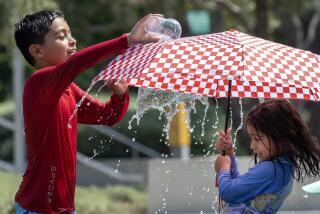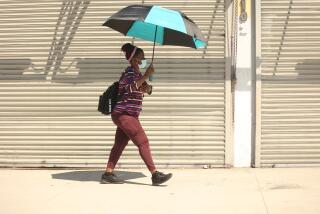Exercising When the Heat Is On
- Share via
Strenuous exercise during a heat wave--particularly when soaring temperatures are accompanied by high humidity and pollution levels--can be dangerous, exercise specialists warn, leading to heart attacks and thermal injuries such as heatstroke and heat exhaustion.
But exercisers don’t have to retreat to the couch until autumn, experts say. Here are their suggestions for staying reasonably cool and healthy when exercising in hot weather:
--Replace fluid. “Drink before, during and after exercise,” advised Elsworth Buskirk, an exercise physiologist and director of the Laboratory for Human Performance Research at Pennsylvania State University, University Park.
“A half-hour to an hour before exercising on a hot day, drink 16 to 20 ounces of water,” advised Kevin Dolan, an exercise physiologist at Centinela National Athletic Health Institute in Culver City. “If you can, drink 6 ounces every 15 to 30 minutes during exercise, depending on your body size and sweat rate. Afterward, drink more than you need to feel content.”
--Modify the environment. “Take advantage of whatever shade might be available,” Buskirk suggested. “Wear a hat if you can.”
“Avoid exercise during peak pollution hours,” added Dr. Jack Hackney, chief of the environmental health service at Rancho Los Amigos Medical Center in Downey, and professor of medicine at the USC School of Medicine. “Exercise instead in the early morning or late afternoon.”
Many people experience symptoms such as coughing, irritation of the breathing passages and chest tightness when ozone levels reach .12 parts per million (averaged over an hour), he said. When pollution levels reach .20--the equivalent of a first-stage smog alert or a pollutant standard index (PSI) of 200--even more people will experience those symptoms, Hackney added.
--Know the warning signs of thermal injuries. These can include clumsiness, stumbling, excessive sweating or cessation of sweating, headache, nausea, dizziness, apathy and gradual impairment of consciousness, according to the American College of Sports Medicine.
--Know when to give up. “The better your physical condition, the better you can adapt to (exercise in) the heat,” Buskirk said. But even for well-conditioned athletes, there’s a quitting point, experts agree. Said Dolan: “If it’s a 90-degree, 90% humidity day, for example, I’d say, ‘Don’t exercise.’ ”
Student Stress and Overweight
Freedom isn’t all some first-year college students gain when they leave home. Many gain weight--and lots of it, say nutrition experts, who blame the excess pounds on overeating, underexercising and an inability to cope with academic stress.
“Different situations tend to make people change their eating habits,” said Bettye Nowlin, a registered dietitian with the Dairy Council of California, citing a recent telephone survey of more than 400 people. “And a major change (in eating habits) occurs when people leave home for the first time.”
Here are some tips for keeping freshman weight-gain to a minimum:
--Consider all the menu options in a residence hall cafeteria before making food choices, Nowlin suggested. Salad bars are often a good choice, she added, if you go easy on high-calorie salad dressings.
--”Deal with stress by taking a walk, not eating a pizza,” advised Joanne McGill, a registered dietitian and assistant food manager at UCLA’s Rieber Hall.
--Pay attention to serving size, an important factor that’s often overlooked, McGill said.
--Increase your fluid intake. Drink water throughout the day to keep feeling full, suggested McGill.
--Limit snack stockpiles to fresh fruit or, if refrigeration is available, fresh vegetables, Nowlin added.
--Check out the athletic facilities. Many schools offer free access to gym equipment.
Promoting the Soundless Gargle
Gargling may not be beneficial, and it’s not an effective remedy for laryngitis, a Los Angeles ear-nose-throat specialist says.
Dr. Robert J. Feder, former chief of otolaryngology at Cedars-Sinai Medical Center, took X-rays of 15 volunteers after they had gargled with a radio-opaque material. In each patient, the substance bathed the throat but never touched the larynx (voice box), the X-rays showed.
Agreed Dr. John Miles, chief of the ear-nose-throat department at Kaiser Permanente in Los Angeles: “People often believe when they gargle that the substance goes way down their throat. It doesn’t.”
Feder also found that gargling--”a mechanism similar to that of clearing one’s throat”--appears to be extremely traumatic and irritating to the vocal mechanism and thus not a good laryngitis remedy or a good habit.
“If you must (gargle), he advised, “don’t make a gargling noise.” Learning how to gargle without making sound will reduce vocal-cord trauma, he added.
To treat laryngitis, Miles recommended, “Breathe warm, moist air through a humidifier. Rest your voice and drink lots of liquids to keep the mucous membranes moist.”
Chicken Pox Vaccine Test
Children and adults who have not had chicken pox are being sought to participate in a test of a new vaccine at Cedars-Sinai Medical Center. Children must be at least 1 year of age, said study director Dr. Philip Brunell, chief of the division of infectious diseases in the department of pediatrics. Volunteers are required to receive the vaccination at Cedars and return twice for blood tests. For more information call (213) 855-4431.
More to Read
Sign up for Essential California
The most important California stories and recommendations in your inbox every morning.
You may occasionally receive promotional content from the Los Angeles Times.













